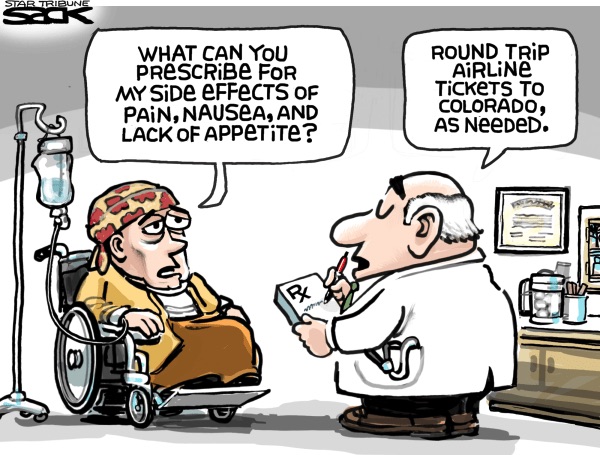Cannabis Is Medicine
It's True, It's Biochemistry, It Shrank My Ovarian Cancer

One point in A.L. Bardach’s anti-cannabis satire demands clarification lest people mistake it for a falsehood. Cannabis is medicine, and it does have powerful anti-tumor properties. This is not my belief: This is biochemistry. I don’t blame you if you think this sounds like snake oil. I was also dubious just a year ago. But that was before cannabis stunned me and my oncologist by shrinking my ovarian cancer.
And it was before I meet Professor Raphael Mechoulam of the Hebrew University of Jerusalem, who discovered the endocannabinoid system, the largest neuroreceptor system in the human body. Every person produces internal cannabinoids, called anandamide and 2-AG (2-arachidonoyl glycerol). These molecules regulate the endocannabinoid system, acting as a thermostat for our physiology, modulating bodily functions and keeping homeostasis. The cannabinoid compounds in medical cannabis act as supplements, working on the same receptors (CB1, CB2, and two dozen others) as the naturally occurring internal cannabinoids we produce. The fact that compounds in cannabis can modulate our primary regulatory system hints at its potential to help a mindbogglingly diverse list of diseases and conditions.
I was skeptical before I spent six months intensively reading peer-reviewed oncology articles in journals like Frontiers in Pharmacology and the International Journal of Molecular Science, with titles like “Anti-Cancer mechanism of cannabis” and “Endocannabinoids as guardians of metastasis.” I encourage everyone to read the science; a collection of a dozen recent peer-reviewed articles and several medical conferences lectures are on my website, schedule1movie.com.
I was incredulous before I meet Dr. David Meiri, who directs 45 PhD researchers at the Laboratory of Cancer Biology and Cannabinoid Research at Israel’s Technion University where the groundbreaking science is unfolding. And before I meet dozens of other cancer patients with extraordinary and unexplained responses to cannabis. I was doubting before, but now I have learned, I understand, and I know.
If you haven’t heard any of this from your doctor, don’t blame them. Most physicians were never trained on the endocannabinoid system. A 2013 survey found only 13 percent of medical schools even mention it! The legacy and stigma of cannabis as an illicit street drug, and its resulting Schedule 1 status (which makes clinical research nearly impossible), is holding us back from groundbreaking discoveries. Taxol, a staple in the chemotherapy toolkit, was derived from a tree. Penicillin was derived from a fungus. Cannabis has over 500 compounds. Why is it so inconceivable that cannabis has molecules that can be harnessed for health?
Cannabis is not a magic cancer cure-all. The plant’s biochemistry is incredibly complex. Cancer is also incredibly complex, driven by hundreds of different broken pathways. Indeed, preclinical data shows that some cancers do not respond to cannabis at all. Fortunately for me, my tumor responded dramatically. Cannabis shrank my tumor, just as the pre-clinical data suggested it would. Under the supervision of a physician who has successfully treated hundreds of cancer patients, I will continue to use cannabis as medicine in my quest to stay alive.



